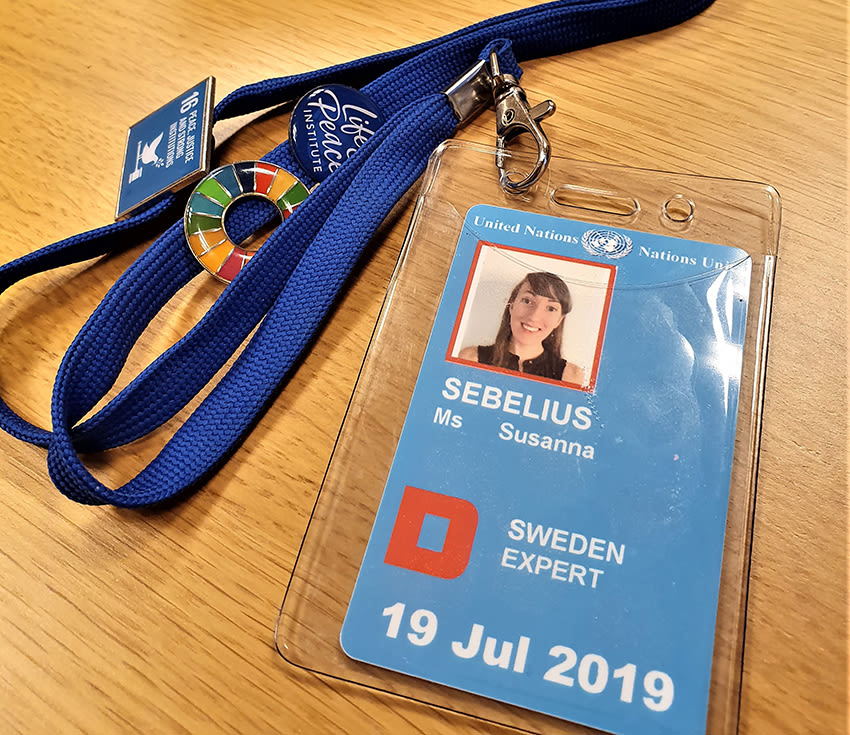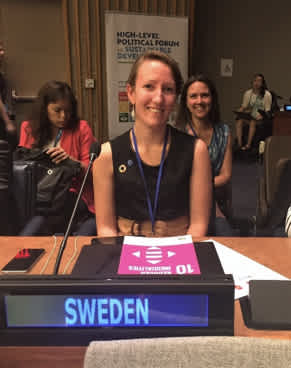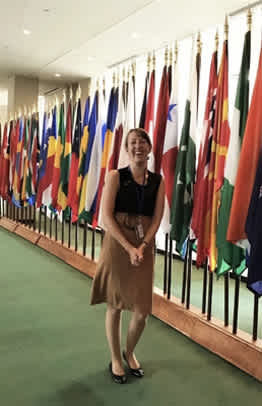
The Life & Peace Institute at the High-Level Political Forum
A Project Officer’s reflections
The following piece offers some personal reflections made by the Life & Peace Institute’s Peacefinders Project Officer, Susanna Sebelius, while attending the High-Level Political Forum (HLPF) in New York City in July 2019.
In July 2019 the Life & Peace Institute (LPI) attended the High-Level Political Forum (HLPF) for Sustainable Development for the first time. HLPF is the annual review mechanism for the 2030 Agenda for Sustainable Development and was created as a space for actors to come together to reflect on progress and challenges to implementation and to create opportunities for collaboration. The forum was also designed with the intent of creating a sense of accountability through its focus on Voluntary National Reviews (VNRs). One of the Global Goals under review in 2019, and therefore one of the Goals focused on during HLPF, was number 16 on Peace, Justice and Strong Institutions.
The 24-25 September meeting marked the first-ever SDG Summit, focusing on accelerating actions toward the implementation of the Global Goals and the conclusion of the first four-year cycle since the adoption of the 2030 Agenda. By building on the experience of the past four years of implementation, and on the strong sense of urgency at HLPF, attending heads of state and government would have been forced to face the stark reality: progress is not happening quickly enough. Though it remains to be seen what specific actions and changes will come out of this summit, and what the pledged accelerator actions will amount to, its recent convening serves as a good opportunity to reflect on HLPF.
LPI came to see HLPF as a valuable forum to engage with through the different aims of the organisation’s Global Policy Programme and Sweden Programme specifically. The focus on Goal 16 – and its strong relevance as the core focus of much of LPI’s work – was one of the incentives for LPI’s interest in participating. In the end, LPI participated in two main ways: as an international civil society organisation and as part of the official Swedish delegation. I had the fortune of being the person representing LPI within the Swedish delegation and, as a result, had my own set of experiences at the forum. As LPI journeyed into this unknown territory, we brought with us one overarching question: ‘who is – and isn’t – here?’

“I will confess that when I first arrived at HLPF, I felt much like Alice having tumbled down the rabbit hole to Wonderland.”
The difference being that instead of being amazed by talking animals, I found myself astonished by the presence of government officials, military colonels and United Nations (UN) officials in the same room as myself. Instead of magic potions, it was the technocratic jargon and evident seniority of many attendees which caused me at times to (figuratively) shrink in size. Instead of a battle raging for the control of a throne, there was a sometimes silent, sometimes vocal, tug-of-war between civil society and governments, for the space to speak and be heard. The UN headquarters, the space for my own Wonderland experience, was a space that managed to be both inviting and restrictive at the same time with its maze-like structure and security checkpoints alongside guided tours for the public and windows offering insight into otherwise restricted areas for the curious visitor.
There was a clear sense of the responsibility that came with being allowed into the space of HLPF and with being a representative of Swedish civil society through the Swedish delegation; the responsibility to not only raise my own thoughts and viewpoints but also those of the organisation I represented as well as the voices of those we work with but who could not be there themselves.
Yet, the ‘wonder’ in Wonderland was prevalent. For those who had been granted access into this space, who had acquired the magical golden (or – in this case – blue) ticket, opportunities to connect with others abounded. Civil society organisations could exchange knowledge and information amongst one another or could approach the many state representatives and UN officials in attendance. The VNRs gave the opportunity to hear of challenges and innovative methods of implementation of the 2030 Agenda from a range of contexts. Side events gave the opportunity to dive deeper into specific topics and Global Goals, presenting a veritable smorgasbord of opportunity and learning. Even outside the UN, civil society created its own spaces to bring people together to learn from and collaborate with each other, echoing the importance of such spaces being created – such conversations taking place – outside the formal venues.
“The answer to the overarching question of who was present and who was missing is that there were many – more than we could mention – who were not present at the forum.”
The answer to the overarching question of who was present and who was missing is that there were many – more than we could mention – who were not present at the forum. People from certain regions, such as the Horn of Africa, were limited in their attendance due to the rigid visa requirements of the United States. This is something that LPI came to discover first-hand as two youth leaders from Kenya, whom LPI wanted to invite to the event, were denied entry. Empty seats during the official programme, such as the empty seat of Syria, were a constant reminder that there is still an urgent need for accelerated efforts toward peace. There were young people present at the forum, usually as youth representatives within official delegations or as part of civil society networks, yet panels often consisted of senior experts or state officials, thereby making youth attending as ‘experts’ the exception, not the norm. Even more rare were side events that were organised and facilitated by young people (with the session on intergenerational equity supported by the Permanent Mission of Canada and the ‘How we saved our future’ event organised by several European youth delegates being two spectacular exceptions from this norm). Though underrepresented, it was when young people spoke their truth that the air positively vibrated with applause – a statement to the power of young people and the necessity of their inclusion.
Because there were so many who were not present, who did not have the opportunity to contribute with their insights, many conversations that might have sparked transformational dialogue were lost. Although there were opportunities for powerful collaboration and innovative solutions to be discovered this did not always seem to happen. The potential for deep and transformational discussions around this global agenda faded due to formats and structures which left little time for questions or comments and left room for improvements to be made in the way of interactive facilitation.
“Though underrepresented, it was when young people spoke their truth that the air positively vibrated with applause – a statement to the power of young people and the necessity of their inclusion.”

HLPF has tremendous potential in terms of the impact it can have by providing a space where innovative, transformational conversations can take place. It can be a forum where people who might never otherwise have met can come together and find creative solutions to complex problems. Yet the forum’s potential of living up to this ideal hinges on a revision of not only the format of these conversations but also of the ability of those who are currently excluded to become included in some way, prompting the forum itself to live up to the promise of leaving no one behind in the review of – and contribution to – the 2030 Agenda.
Much like Alice, as she returned home from Wonderland, my time inside the UN building seems equal parts dream and reality. As with any experience that induces growth, it was at times thrilling and at times overwhelming - but it ultimately presented me with knowledge and insights that I will carry with me as I continue my work within LPI and beyond. If I ever find myself tumbling down the same rabbit hole again, returning to Wonderland, I will do my very best to contribute to its wonderous potential for transformation, innovation, and collaboration.
And to all the other Alices out there, I would like to say this: you do deserve to have a seat at the table, even if you landed at the seat through tumbling down a rabbit hole.
Most recent blog posts
2026-01-13
Placing Local Voices at the Centre of Regional Peacekeeping ConversationsA Reflection from the Horn Dialogue Series IV
